Jim Pearsall
Reviews By Author
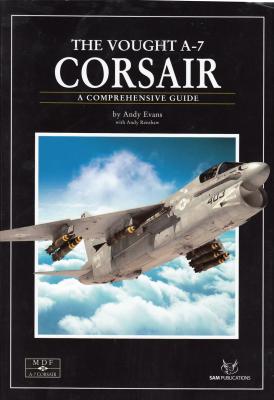
|
The Vought A-7 CorsairPublished:
SAM Publications series of Modelers Datafiles cover a lot of ground in a single book. This one is on the Vought A-7 Corsair II, and it gives plenty of information in a single book that most modelers need when researching and building a model. The A-7 was the replacement for the Douglas A-4 Skyhawk. Even a casual observer can see that what Vought did was take their successful F-8 Crusader and shorten it. They also put a non-afterburning turbofan engine in there, improving range and fuel economy. And with the advances in electronics and weapons in the 1960s, the A-7 was a very accurate bomb-dropper, and it could carry a pretty good load of various weapons. The book consists of the following sections
|
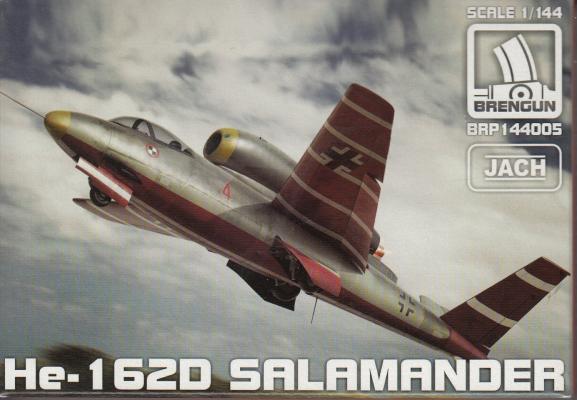
|
Heinkel He-162DPublished:
The AircraftThe Heinkel 162 series was a last-ditch effort by the RLM to stop the destruction of Germany’s industries, transportation system and energy distribution by Allied bombing. The project began in September of 1944, with the prototypes first flown in December. The He-162A versions were mostly wood construction, with the single turbojet engine. It ended up being the fastest jet fighter flown during WW2. The wood construction turned out to be highly problematical, as the glue used was not compatible with the wood, and the second prototype flight ended with one aileron coming apart, and the aircraft crashed, killing the pilot. The He-162A also suffered from weakness in the horizontal and vertical stabilizers on the tail. The He-162D’s V tail was supposed… more |
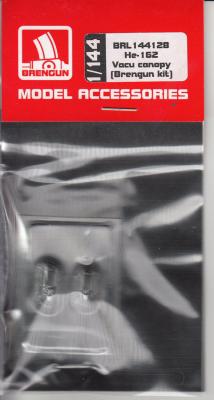
|
He-162 Vacu Canopy (Brengun kit)Published:
The KitThis is a replacement or upgrade for the Brengun He-162 kits. There are two canopies on the Vac-Form plastic. I didn’t look at this item until I was ready to install the canopy, and I now wish I had looked closer and sooner. One of the canopies is a direct replacement for the kit item. The other one is the AMS version. It’s a little longer, and there’s an area between the windscreen and canopy which can be cut out so you can build your He-162 with the canopy open. Of course this will require quite a bit of interior detailing for the cockpit. The Brengun kit comes with a seat, a stick and a blank instrument panel. Obviously it would require seat belts, instruments, rudder pedals, a throttle, and the open canopy support rod. As I said, AMS version. … more |
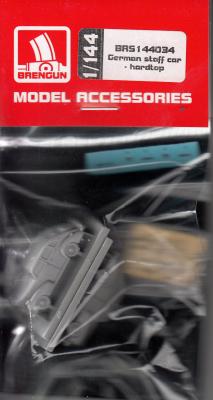
|
German Staff CarPublished:
The VehicleEvery armed force in World War II used civilian automobiles as transportation for “important” people. There were American Dodges, Buicks, and Fords. The British used Bentleys and Austin. The Germans used Opels and Horches. Brengun doesn’t specify which model of automobile this kit represents, but it’s obviously a “luxury” car, with a hard top and 4 doors. It’s definitely nicer than Hans-Joachim Marseille’s Kubelwagen. The KitYou get two resin staff cars in the kit. There is a PE fret an instruction sheet, and a small decal sheet with license plates for two cars. AssemblyThere really isn’t any assembly to this kit. I removed the pour block from the connectors at the bottom of the car, and then cut… more |
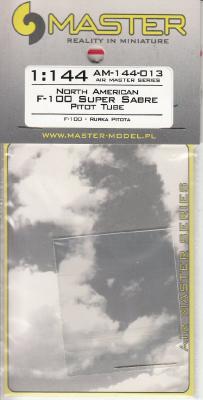
|
F-100 Super Sabre Pitot TubePublished:
Master Model of Poland produces small brass parts for detailing models, be they aircraft or ships. They have parts for aircraft in 1/32, 1/35, 1/48, 1/72, and 1/144, mostly pitot tubes, refueling probes, and gun barrels. This “add-on” is a single pitot tube. It’s very fine turned brass. The detail is so fine that I had to use my magnifiers to determine that there are three different diameters on the pitot, getting smaller at about 1/3 and 2/3 of the length. The instructions are to the point:
I was able to skip step 4, as the kit pitot was already mounted under the… more |
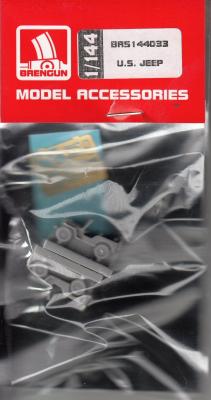
|
US Army JeepPublished:
The JeepThe original Jeep was built by Bantam, but Ford and Willys also bid on the original contract. Due to financial problems at Bantam, the other two companies were given contracts to build Jeeps. Bantam called theirs BRC-40 Willys was the MB, the Ford was called GPW. The Jeep was a ¼ ton all-wheel drive vehicle, with a wheelbase of 80 inches and a track of 47 inches. Willys produced 363,000 Jeeps, Ford made 280,000. We gave 51,000 to the Russians. They were used in every theater of WW2. The KitThe base kit is one very nicely cast piece of resin, which is almost the entire Jeep. There is a PE fret, of which 3 parts are used. There’s a decal sheet with all the markings you need. You get enough in the envelope to build two Jeeps, with PE and… more |
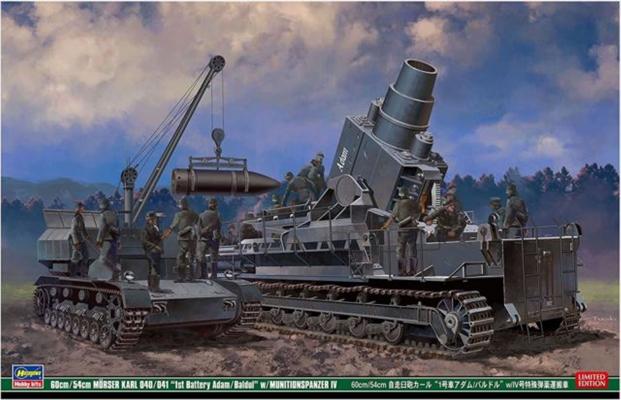
|
60/54cm Morser Karl w/Munitionspanzer IV Limited EditionPublished:
The Karl “Gerät” (device) was a huge self-propelled siege mortar. The 60cm shells weighed around 5000 pounds and contained several hundred pounds of explosives. Hasegawa says that the Karl made a “significant impact” wherever it was used. The problems with Karl were that it wasn’t very mobile, and it required special ammunition. When a Karl was in use, it had to be in a special firing position, which should be level and support the chassis. This is Hasegawa’s release of their Karl Mortar in 1/72. It includes the “Munitionschlepper” Panzer IV. This kit has been released before, with the Munitionschlepper or with the railway transport add-on. What makes this kit desirable is that you get more options for the basic Karl mortar. The two big options are:
|
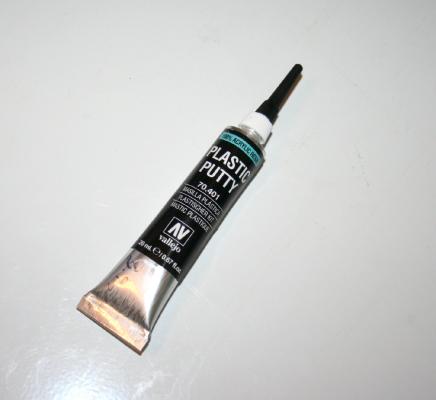
|
Acrylic White PuttyPublished:
Vallejo’s name is well recognized in the scale modeling field. They have a huge array of products, and their specialized modeling products line is one of the best in the world. At our last IPMS Chapter meeting, Keith Pieper of Avalon Books gave me a tube of Vallejo’s new white Plastic Putty. The putty itself is an acrylic medium with white color and marble dust. The added marble dust makes the putty more durable than most. The tube is fairly small, 20 ml., but with the fine applicator “spout”, it goes pretty much where I put it, so I have less waste of putty when I’m doing a seam. The first time I tried it, I put the putty on the cab of an Italeri Opel Blitz ambulance in 1/72, which needed a pretty good fill between the hood and the doors of the cab. After I let it set… more |
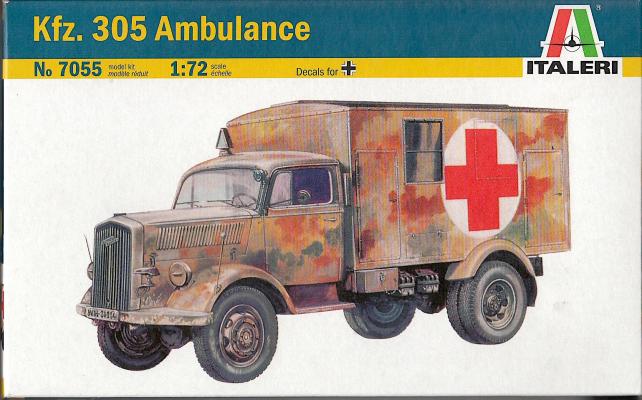
|
Opel Kfz. 305 AmbulancePublished:
The Opel “Blitz” truck was produced from 1930 to 1975. It was used as a commercial vehicle, and when the Wehrmacht needed a reliable and fast truck, the Blitz was chosen. In 1937, the Nazis had Opel build a factory at Brandenburg, which turned out over 130,000 Blitzes, until the RAF stopped production in 1944 by bombing the plant. This kit is the ambulance version of the Opel Blitz. The ambulance had a transportation box on the back to handle casualties. The KitThere are two sprues, along with a clear sheet for windows, and a decal sheet. One sprue is for the chassis and cab, the other is the ambulance box. No PE, no resin, no problem. The model is fairly straightforward to build. There’s a frame section, the cab, the ambulance box, the wheels, and… more |
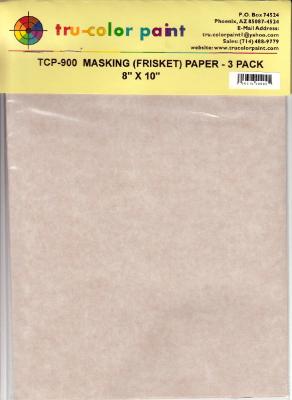
|
Masking Frisket PaperPublished:
I did a review of Tru-Color Paints a while back, (http://web.ipmsusa3.org/content/tru-color-paints ) and I asked the guys at Tru-Color if I could do a review of their new Frisket Paper. They said OK, and I bought a 3-pack of the paper at our last IPMS Chapter meeting. I bought the 3-pack, because I thought I had a project which might need a couple of sheets, but not much more. My project was a 1/144 Model Lancaster, which I wanted to convert from a Dam Buster to a Grand Slam carrier. RAF camouflage is usually quite difficult to do, or at least it’s a fairly long project. I took the camouflage drawing from the instruction sheet. It wasn’t the same size as the model. I scanned the instruction, then put the… more |
